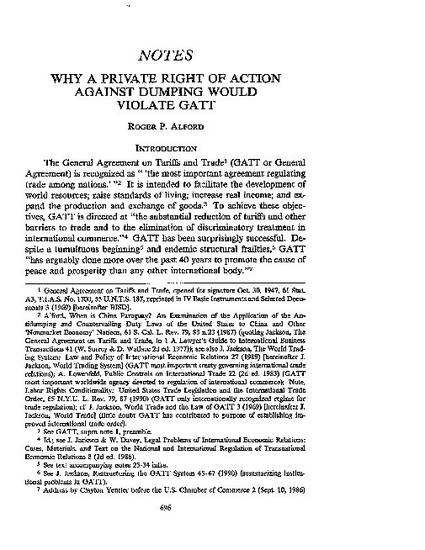
Despite its other successes, the General Agreement on Tariffs and Trade (GATT) has been criticized as being anything but successful in the antidumping arena. In particular, industries in the United States argue that GATT has failed to control dumping effectively and that alternative forms of relief are needed to counteract this unfair trade practice. The root of their concerns is the prospective nature of the existing remedy. Since antidumping duties are assessed only after a violation has been detected, dumping is essentially a risk-free, no-lose proposition, giving foreign exporters a free "first bite at the apple." The absence of monetary damages for injuries sustained as a result of dumping compounds manufacturers' difficulties.
In response to the growing sentiment that American trade laws do not reflect the realities of international commerce, Congress has introduced several initiatives seeking to strengthen these laws to combat unfair trade practices more effectively. One specific proposal, which has received a flood of congressional interest but little scholarly attention, is the establishment of a private right of action to counteract illegal dumping. In contrast to the current procedure that requires an administrative proceeding to determine the propriety of imposing an antidumping duty, such a proposal would give United States industries direct access to federal courts to recover monetary damages for any injury caused by dumping and, in some cases, to receive injunctive relief halting the entry of dumped imports.
Despite its favorable implications, a private right of action raises grave concerns over its compatibility with the United States's international obligations under GATT. Indeed, this Note argues that the establishment of a private right of action granting domestic firms direct access to federal courts to seek monetary and injunctive relief against foreign dumping is a violation of the General Agreement. Part I provides a brief overview of GATT and the international and domestic antidumping laws. Part II discusses the problems with the current American antidumping laws and summarizes the proposals for a private right of action against dumping as a means to remedy these problems. Part III analyzes the relation of the proposed bills to five provisions of the General Agreement and concludes that a private right of action is not compatible with GATT.
Available at: http://works.bepress.com/roger_alford/19/

Printed with permission of New York University Law Review.